人教版选择性必修第一册Unit 2 Looking into the Future单元复习课件(共50张PPT)
文档属性
| 名称 | 人教版选择性必修第一册Unit 2 Looking into the Future单元复习课件(共50张PPT) | 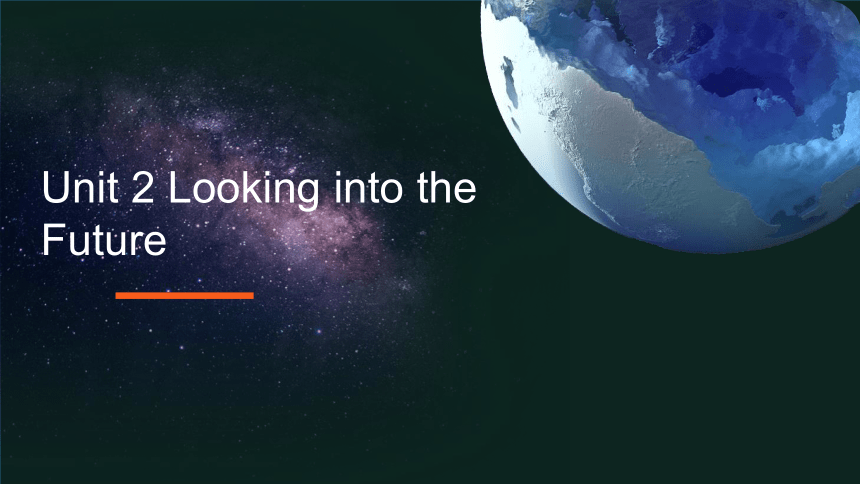 | |
| 格式 | pptx | ||
| 文件大小 | 3.2MB | ||
| 资源类型 | 教案 | ||
| 版本资源 | 人教版(2019) | ||
| 科目 | 英语 | ||
| 更新时间 | 2023-02-02 17:50:49 | ||
图片预览

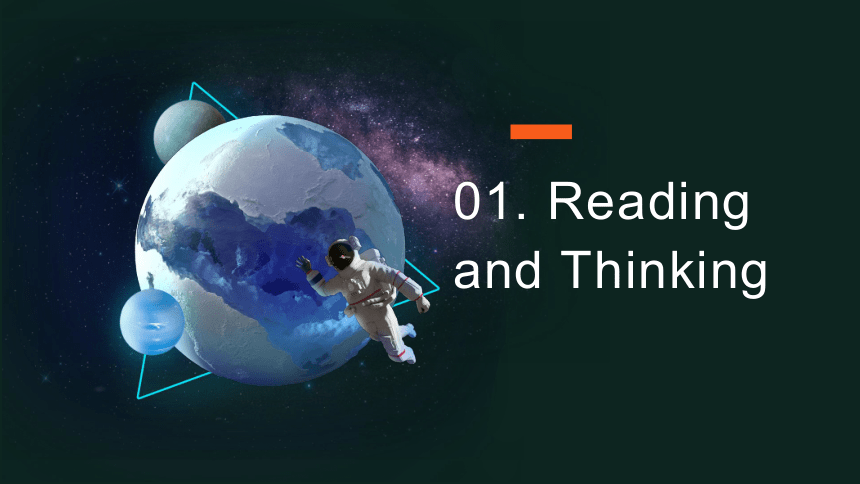
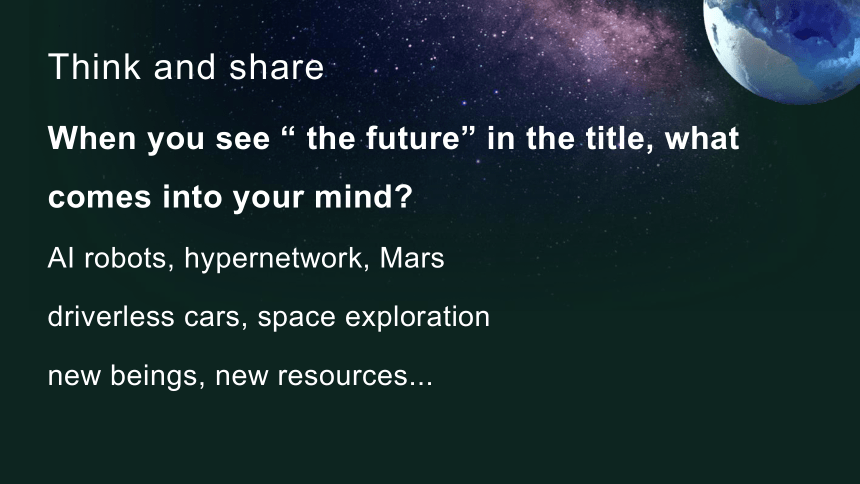
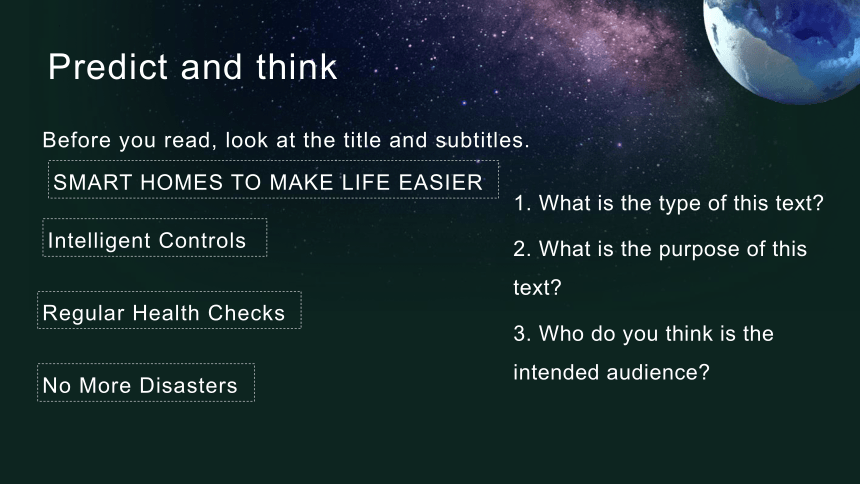
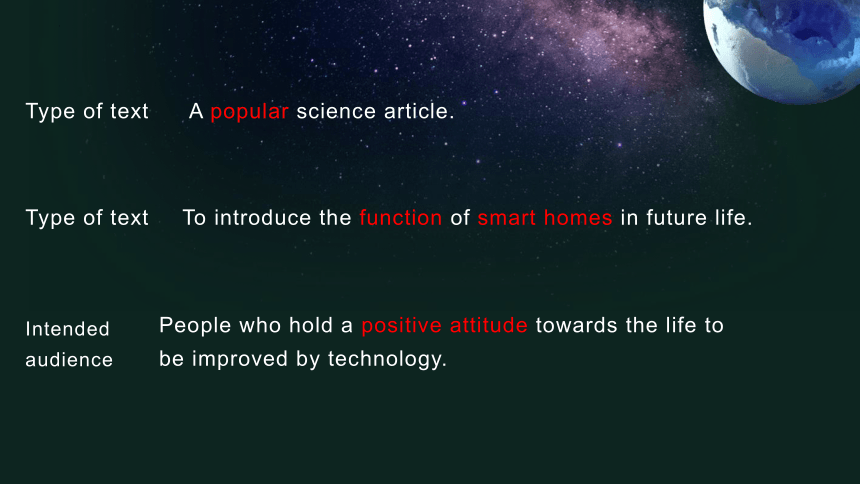
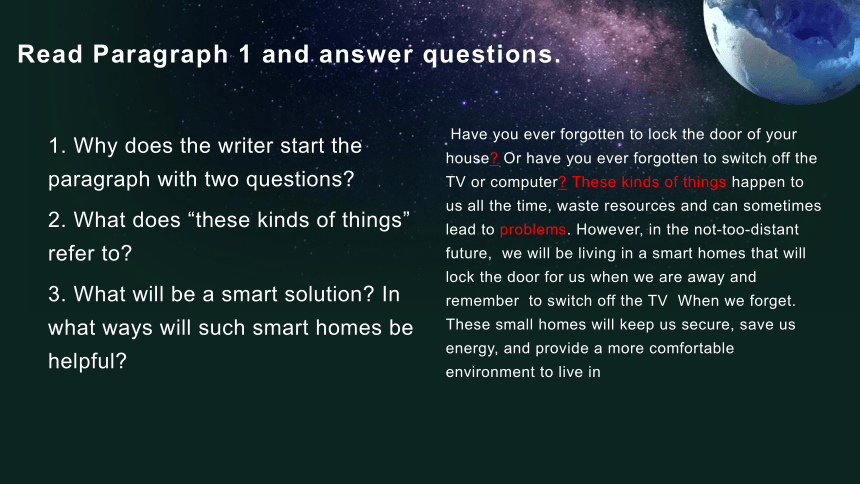
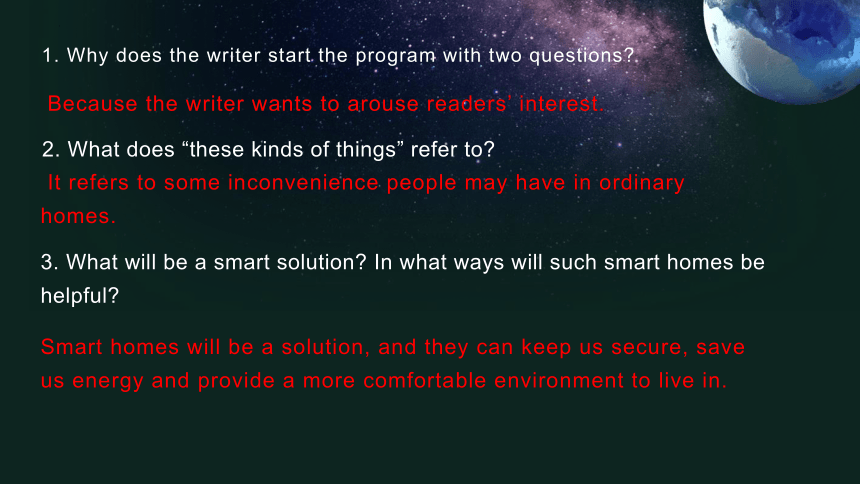
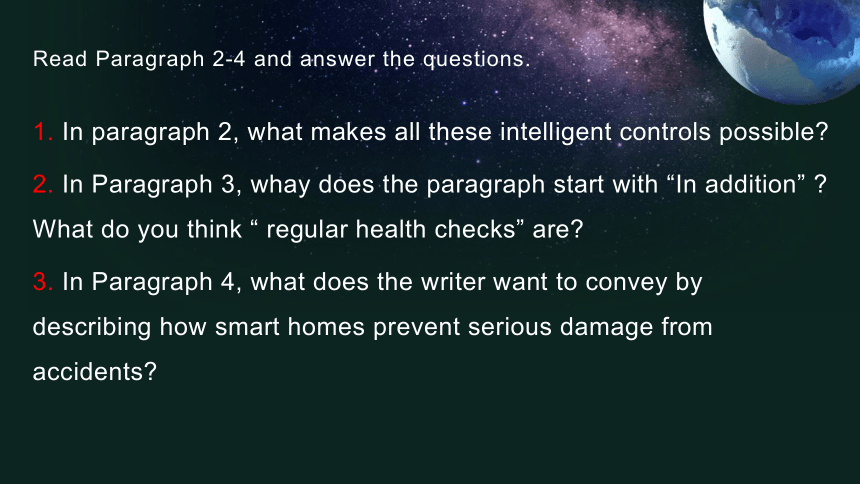
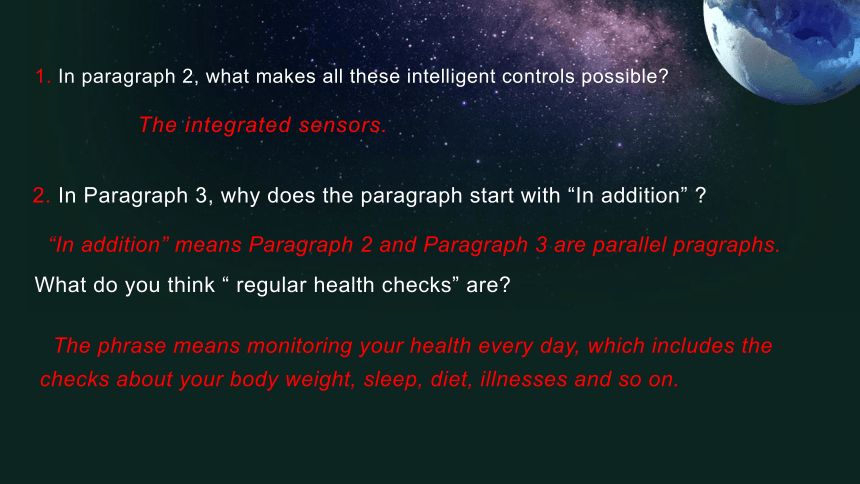
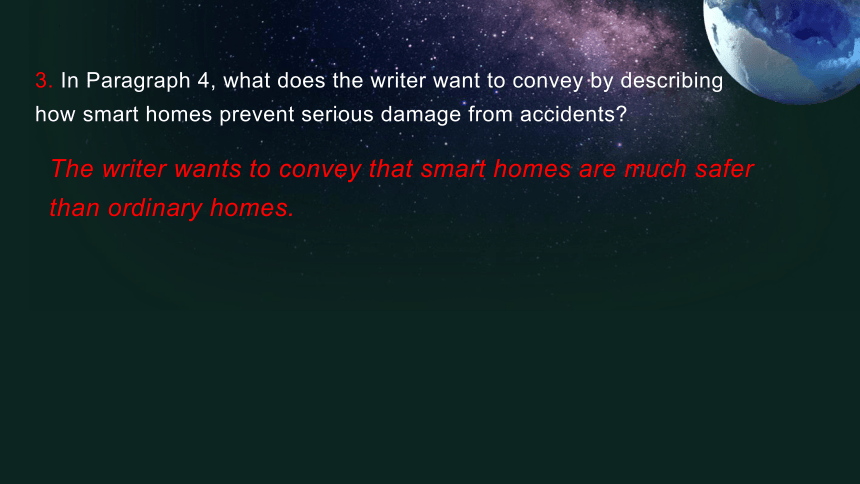
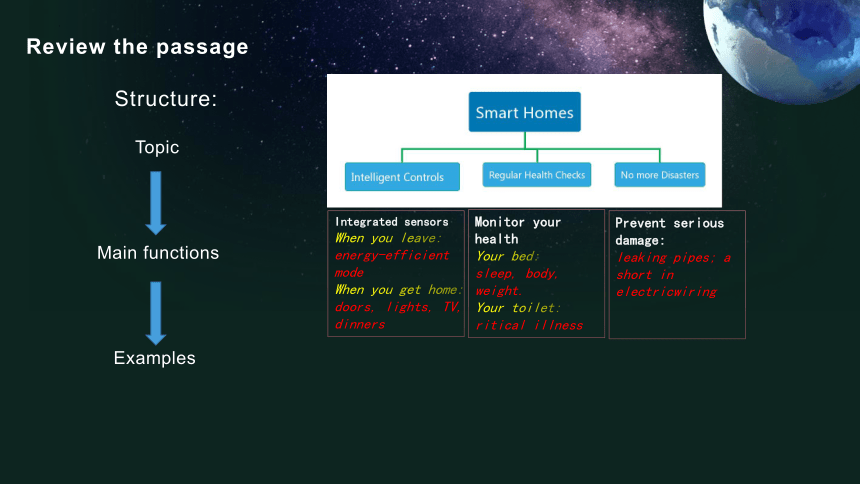
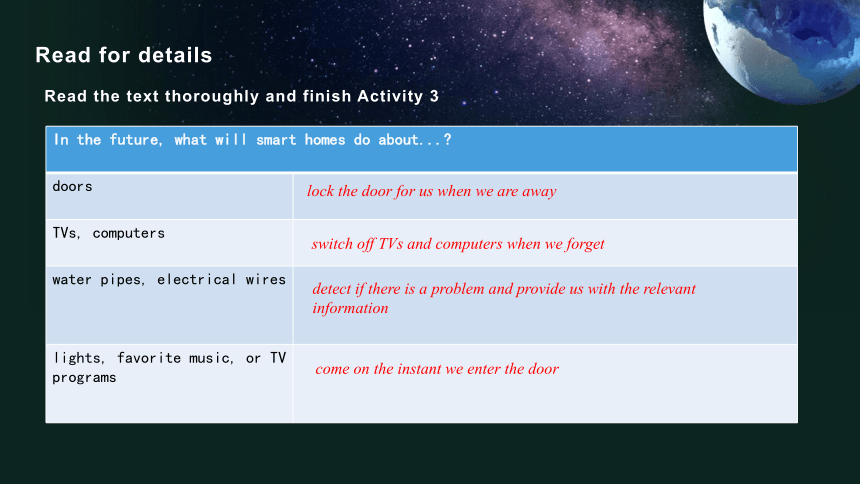
文档简介
(共50张PPT)
Unit 2 Looking into the Future
01. Reading and Thinking
Think and share
When you see “ the future” in the title, what comes into your mind
AI robots, hypernetwork, Mars
driverless cars, space exploration
new beings, new resources...
Predict and think
Before you read, look at the title and subtitles.
1. What is the type of this text
2. What is the purpose of this text
3. Who do you think is the intended audience
SMART HOMES TO MAKE LIFE EASIER
Intelligent Controls
Regular Health Checks
No More Disasters
Type of text
A popular science article.
Type of text
To introduce the function of smart homes in future life.
Intended audience
People who hold a positive attitude towards the life to be improved by technology.
Read Paragraph 1 and answer questions.
1. Why does the writer start the paragraph with two questions
2. What does “these kinds of things” refer to
3. What will be a smart solution In what ways will such smart homes be helpful
Have you ever forgotten to lock the door of your house Or have you ever forgotten to switch off the TV or computer These kinds of things happen to us all the time, waste resources and can sometimes lead to problems. However, in the not-too-distant future, we will be living in a smart homes that will lock the door for us when we are away and remember to switch off the TV When we forget. These small homes will keep us secure, save us energy, and provide a more comfortable environment to live in
1. Why does the writer start the program with two questions
2. What does “these kinds of things” refer to
3. What will be a smart solution In what ways will such smart homes be helpful
Because the writer wants to arouse readers’ interest.
It refers to some inconvenience people may have in ordinary homes.
Smart homes will be a solution, and they can keep us secure, save us energy and provide a more comfortable environment to live in.
Read Paragraph 2-4 and answer the questions.
1. In paragraph 2, what makes all these intelligent controls possible
2. In Paragraph 3, whay does the paragraph start with “In addition” What do you think “ regular health checks” are
3. In Paragraph 4, what does the writer want to convey by describing how smart homes prevent serious damage from accidents
1. In paragraph 2, what makes all these intelligent controls possible
The integrated sensors.
2. In Paragraph 3, why does the paragraph start with “In addition”
“In addition” means Paragraph 2 and Paragraph 3 are parallel pragraphs.
What do you think “ regular health checks” are
The phrase means monitoring your health every day, which includes the checks about your body weight, sleep, diet, illnesses and so on.
3. In Paragraph 4, what does the writer want to convey by describing how smart homes prevent serious damage from accidents
The writer wants to convey that smart homes are much safer than ordinary homes.
Review the passage
Topic
Main functions
Examples
Integrated sensors
When you leave:
energy-efficient mode
When you get home:
doors, lights, TV, dinners
Monitor your health
Your bed:
sleep, body, weight.
Your toilet:
ritical illness
Prevent serious damage:
leaking pipes; a short in electricwiring
Structure:
Read for details
Read the text thoroughly and finish Activity 3
In the future, what will smart homes do about...
doors
TVs, computers
water pipes, electrical wires
lights, favorite music, or TV programs
lock the door for us when we are away
switch off TVs and computers when we forget
detect if there is a problem and provide us with the relevant information
come on the instant we enter the door
In the future, what will smart homes do about...
dinners
beds
toilets
prepare dinner for us
record how well we sleep every night, check our body weight, send a warning to our phones when we have sleep or weight problems, and give us suggestions on a healthier diet and how to sleep better
keep constant track of our health and warm us early on if there is something wrong
Think
1. What advantages do smart homes have
Saving energy, saving time, monitoring health, and preventing disasters.
2.What’s the writer’s attitude towards smart homes How do you know that
Optimistic, positive, hopeful.
Answer the two questions according to the text.
Work in Groups
Discuss these questions
1. In what way is the home of tomorrow already the home of today
Many of the new innovations are already used in some homes today. This is true especially of automatic controls for things such as lights and air conditioners.
2. What might be some of the disadvantages of smart homes
One disadvantage is that if there is a problem with the system, you may find yourself locked out of the house or unable to turn your TV off or on. Security is another big concern, as strangers may be able to hack into the system to collect Information about your life and use that for evil purpose.
Homework
1. Read the text aloud.
2. Finish Activity 4 on P15.
3. Introduce smart homes in your mind.
02 Grammar
eg 1: I will be watching a fashion show this time tomorrow.
eg 2:
-When do you leave for Hawaii
-Tomorrow. Just think, two days from now I will be lying on the beach in the sun.
1. Read the two examples and find out the common point.
将来进行时 will be doing
将来某个时间点正在发生的动作
2. eg 3: Don’t phone me between 5 to 6 tomorrow. I will be boarding the plane.
eg 4: I am so glad that I will be experiencing a different fashion style during the trip in Hawaii.
将来进行 will be doing
表将来某个时段一直在进行的动作
3. 总结
将来进行时 will be doing
1) 表将来某个时间点正在进行的动作
2) 表将来某个时段一直在进行的动作
4. 句式
1)陈述句: 主语+will (not) be doing+其他.
2)一般疑问句:will+主语+be doing+其他?
3) 特殊疑问句:特殊疑问词+will+主语+be doing+其他?
(辽宁) I feel so excited! At this time tomorrow morning I _______ to Shanghai.
A. will be flying B. will fly C. have been flying D. have flown
You’d better not phone our manager from three to four this afternoon; he _______ the meeting then.
A. will be preparing B. will prepare
C. is preparing D. prepares
A
A
时间提示词
1. 表将来某个时间点
I will be watching a fashion show this time tomorrow.
Just think, two days from now I will be lying on the beach inthe sun.
经典款:(at) this/that time +将来时间;时间段+fromnow; by this/that time+将来时间
细品款:when...; while...
I will be doing my homework when you are in Hawaii.
I will be doing my homework while you are watching the show.
一般现在时表将来
2. 表将来某个时间段
Don’t phone me between 5 to 6 tomorrow. I will be boarding the plane.
I am so glad that I will be experiencing a different fashion style during the trip in Hawaii.
经典款:from...to...+将来时间;during...; between...to...+将来时间
细品款:until...
I think that she will be working on this experiment until next morning.
3. 结合具体语境(隐含的时间标志词)
蜜汁迷惑款:soon; this evening; on Sunday, tomorrow, in two days, tomorrow morning, 甚至无(一般将来时)
eg 1.-Can you attend the party tomorrow
-No, I will be meeting the boss about something urgent.
开party的时候我将正在见老板
eg 2.-If you see Sally, can you ask her to phone me
-Sure, I will be seeing her this evening, so I’ll tell her then.
今晚某个点我会见到她
总结:将来进行时will be doing时间标志词
1. 表将来某个时间点
经典款:(at) this/that time +将来时间;时间段+fromnow; by this/that time+将来时间
细品款:when...; while...
2. 表将来某个时间段
经典款:from...to...+将来时间;during...; between...to...+将来时间
细品款:until...
3. 蜜汁迷惑款:结合具体语境
3. I am going on my dream vacation to Hainan. While you are doing your homework, I __________ on a sunny beach.
A. lay B. has been lying C. will be lying D. would be lying
4. (2020江苏三模)-I am going to visit Britain this summer vacation.
-I am glad you __________ a different culture.
A. will have experienced B. will be experiencing
C. have experienced D. are experienced
C
B
一般将来时&将来进行时&现在进行时
I will fly to Hawaii tomorrow. So two days from now I will be lying on the beach in the sun. And I am leaving in five minutes.
区别?
一般将来时&将来进行时
1)I will fly to Hawaii tomorrow.
(明天将要发生的事)
(will表意愿、决心、打算)
2)I will be flying to Hawaii tomorrow.
(明天某个点或某个时间段正在发生的事)
(will be doing单纯表将来)
1. 一般将来时不能表示将来某个时间点或某个时间段正在发生的事情;will be doing 更单纯表将来会发生的事。
--When do you leave for Hawaii
--Tomorrow. I will lie on the beach in the sun tow days later.
--Tomorrow. Just think ,two days from now I will be lying on the beach in the sun.
2.将来进行时更加形象生动。
现在进行时&将来进行时
1. 现在进行时&将来进行时
此时此刻正在发生的动作或存在的状态
将来某个时间点或某个时间段发生的动作或一直存在的状态
2. 现在进行时表将来
1)一般情况下现在进行时表示最近的将来的时候,必须要有确定的时间。
I am cooking the dinner.
(只表示现在进行)
I am cooking the dinner this evening.
(表将来)
2)一些特殊的动词 leave, go, come等,没有时间状语也可以表将来。
The train is leaving.
He is coming.
1. 一般将来时&将来进行时
1)一般将来时不能表示将来某个时间点或某个时间段正在发生的事情;will be doing 更单纯表将来会发生的事。
2)将来进行时更加形象生动。
2.现在进行时&将来进行时
1)现在进行时&将来进行时
此时此刻正在发生的动作或存在的状态
将来某个时间点或某个时间段发生的动作或一直存在的状态
2) 现在进行时表将来
一般情况下现在进行时表示最近的将来的时候,必须要有确定的时间。
一些特殊的动词 leave, go, come等,没有时间状语也可以表将来
1. The summer holiday____________ (approach), and I plan to go to Beijing.
2. It is reporyed that a space station ______________(build) on the moon in years to come.
3. Jane can’t attend the meeting at 3 o’clock this afternoon because she ______________(teach)a class at that time.
is approaching
will be built
will be teaching
英翻中:(江西)In the coming three years, our school life will be challenging.
参考答案:在未来的三年里,我们的校园生活将会是具有挑战性的。
中翻英:
-Dr. Jackson is not in his office at the moment.
-All right.________________________(我待会儿再打给他).
参考答案:I’ll call him later.
03 Using Language
Lead-in Activity: Think and share
Welcome or reject future changes
1. What’s your point of view on new technology
2. What new devices or apps have you been using recently Are they helpful or not
Lead-in Activity: Discuss the news
“Passenger Dies When Car Crashes in Driverless Mode”
Reading Activity: Read for main idea
Should We Fight New Technology
What is the passage mainly about
It’s about the advantages and disadvantages of new technology and the author’s own opinion.
Reading Activity: Read and find out the structur.
In which paragraphs does the author:
1. describe the issue
2. give an opinion
3. discuss the advantages
4. discuss the disadvantages
Read Paragraph 1 and find out what the author daes in this paragraph.
The author describes the issue in Para. 1.
Read Paragraph 2 and find out what the author daes in this paragraph.
The author discusses the disadvantages in Para. 2.
Read Paragraph 3 and find out what the author daes in this paragraph.
The author discusses the advantages in Para. 3.
Read Paragraph 4 and find out what the author daes in this paragraph.
The author gives an opinion in Para. 4.
Reading Activity: Read and decide whether the statements are true(T) or false(F).
1. A person died in an accident while driving a car.
2. The Amish avoid new technology because they do not want to have good lives.
F
F
3. Many disasters have been prevented by weather tracking computer programs.
4. Building large networks through social media helps us find new opportunities.
5. The author uses a health monitor to know how much exercise he or she needs
F
T
T
Reading Activity: Read and find out the signposts of this passage.
on the one hand...on the other hand...
hence
neverthless
moreover
for example
personally
04 Writing
1.开头段:介绍写信者,并交代清楚写信目的;
2.主体段:
3.结尾段:
How to write a letter to yourself from the future
Unit 2 Looking into the Future
01. Reading and Thinking
Think and share
When you see “ the future” in the title, what comes into your mind
AI robots, hypernetwork, Mars
driverless cars, space exploration
new beings, new resources...
Predict and think
Before you read, look at the title and subtitles.
1. What is the type of this text
2. What is the purpose of this text
3. Who do you think is the intended audience
SMART HOMES TO MAKE LIFE EASIER
Intelligent Controls
Regular Health Checks
No More Disasters
Type of text
A popular science article.
Type of text
To introduce the function of smart homes in future life.
Intended audience
People who hold a positive attitude towards the life to be improved by technology.
Read Paragraph 1 and answer questions.
1. Why does the writer start the paragraph with two questions
2. What does “these kinds of things” refer to
3. What will be a smart solution In what ways will such smart homes be helpful
Have you ever forgotten to lock the door of your house Or have you ever forgotten to switch off the TV or computer These kinds of things happen to us all the time, waste resources and can sometimes lead to problems. However, in the not-too-distant future, we will be living in a smart homes that will lock the door for us when we are away and remember to switch off the TV When we forget. These small homes will keep us secure, save us energy, and provide a more comfortable environment to live in
1. Why does the writer start the program with two questions
2. What does “these kinds of things” refer to
3. What will be a smart solution In what ways will such smart homes be helpful
Because the writer wants to arouse readers’ interest.
It refers to some inconvenience people may have in ordinary homes.
Smart homes will be a solution, and they can keep us secure, save us energy and provide a more comfortable environment to live in.
Read Paragraph 2-4 and answer the questions.
1. In paragraph 2, what makes all these intelligent controls possible
2. In Paragraph 3, whay does the paragraph start with “In addition” What do you think “ regular health checks” are
3. In Paragraph 4, what does the writer want to convey by describing how smart homes prevent serious damage from accidents
1. In paragraph 2, what makes all these intelligent controls possible
The integrated sensors.
2. In Paragraph 3, why does the paragraph start with “In addition”
“In addition” means Paragraph 2 and Paragraph 3 are parallel pragraphs.
What do you think “ regular health checks” are
The phrase means monitoring your health every day, which includes the checks about your body weight, sleep, diet, illnesses and so on.
3. In Paragraph 4, what does the writer want to convey by describing how smart homes prevent serious damage from accidents
The writer wants to convey that smart homes are much safer than ordinary homes.
Review the passage
Topic
Main functions
Examples
Integrated sensors
When you leave:
energy-efficient mode
When you get home:
doors, lights, TV, dinners
Monitor your health
Your bed:
sleep, body, weight.
Your toilet:
ritical illness
Prevent serious damage:
leaking pipes; a short in electricwiring
Structure:
Read for details
Read the text thoroughly and finish Activity 3
In the future, what will smart homes do about...
doors
TVs, computers
water pipes, electrical wires
lights, favorite music, or TV programs
lock the door for us when we are away
switch off TVs and computers when we forget
detect if there is a problem and provide us with the relevant information
come on the instant we enter the door
In the future, what will smart homes do about...
dinners
beds
toilets
prepare dinner for us
record how well we sleep every night, check our body weight, send a warning to our phones when we have sleep or weight problems, and give us suggestions on a healthier diet and how to sleep better
keep constant track of our health and warm us early on if there is something wrong
Think
1. What advantages do smart homes have
Saving energy, saving time, monitoring health, and preventing disasters.
2.What’s the writer’s attitude towards smart homes How do you know that
Optimistic, positive, hopeful.
Answer the two questions according to the text.
Work in Groups
Discuss these questions
1. In what way is the home of tomorrow already the home of today
Many of the new innovations are already used in some homes today. This is true especially of automatic controls for things such as lights and air conditioners.
2. What might be some of the disadvantages of smart homes
One disadvantage is that if there is a problem with the system, you may find yourself locked out of the house or unable to turn your TV off or on. Security is another big concern, as strangers may be able to hack into the system to collect Information about your life and use that for evil purpose.
Homework
1. Read the text aloud.
2. Finish Activity 4 on P15.
3. Introduce smart homes in your mind.
02 Grammar
eg 1: I will be watching a fashion show this time tomorrow.
eg 2:
-When do you leave for Hawaii
-Tomorrow. Just think, two days from now I will be lying on the beach in the sun.
1. Read the two examples and find out the common point.
将来进行时 will be doing
将来某个时间点正在发生的动作
2. eg 3: Don’t phone me between 5 to 6 tomorrow. I will be boarding the plane.
eg 4: I am so glad that I will be experiencing a different fashion style during the trip in Hawaii.
将来进行 will be doing
表将来某个时段一直在进行的动作
3. 总结
将来进行时 will be doing
1) 表将来某个时间点正在进行的动作
2) 表将来某个时段一直在进行的动作
4. 句式
1)陈述句: 主语+will (not) be doing+其他.
2)一般疑问句:will+主语+be doing+其他?
3) 特殊疑问句:特殊疑问词+will+主语+be doing+其他?
(辽宁) I feel so excited! At this time tomorrow morning I _______ to Shanghai.
A. will be flying B. will fly C. have been flying D. have flown
You’d better not phone our manager from three to four this afternoon; he _______ the meeting then.
A. will be preparing B. will prepare
C. is preparing D. prepares
A
A
时间提示词
1. 表将来某个时间点
I will be watching a fashion show this time tomorrow.
Just think, two days from now I will be lying on the beach inthe sun.
经典款:(at) this/that time +将来时间;时间段+fromnow; by this/that time+将来时间
细品款:when...; while...
I will be doing my homework when you are in Hawaii.
I will be doing my homework while you are watching the show.
一般现在时表将来
2. 表将来某个时间段
Don’t phone me between 5 to 6 tomorrow. I will be boarding the plane.
I am so glad that I will be experiencing a different fashion style during the trip in Hawaii.
经典款:from...to...+将来时间;during...; between...to...+将来时间
细品款:until...
I think that she will be working on this experiment until next morning.
3. 结合具体语境(隐含的时间标志词)
蜜汁迷惑款:soon; this evening; on Sunday, tomorrow, in two days, tomorrow morning, 甚至无(一般将来时)
eg 1.-Can you attend the party tomorrow
-No, I will be meeting the boss about something urgent.
开party的时候我将正在见老板
eg 2.-If you see Sally, can you ask her to phone me
-Sure, I will be seeing her this evening, so I’ll tell her then.
今晚某个点我会见到她
总结:将来进行时will be doing时间标志词
1. 表将来某个时间点
经典款:(at) this/that time +将来时间;时间段+fromnow; by this/that time+将来时间
细品款:when...; while...
2. 表将来某个时间段
经典款:from...to...+将来时间;during...; between...to...+将来时间
细品款:until...
3. 蜜汁迷惑款:结合具体语境
3. I am going on my dream vacation to Hainan. While you are doing your homework, I __________ on a sunny beach.
A. lay B. has been lying C. will be lying D. would be lying
4. (2020江苏三模)-I am going to visit Britain this summer vacation.
-I am glad you __________ a different culture.
A. will have experienced B. will be experiencing
C. have experienced D. are experienced
C
B
一般将来时&将来进行时&现在进行时
I will fly to Hawaii tomorrow. So two days from now I will be lying on the beach in the sun. And I am leaving in five minutes.
区别?
一般将来时&将来进行时
1)I will fly to Hawaii tomorrow.
(明天将要发生的事)
(will表意愿、决心、打算)
2)I will be flying to Hawaii tomorrow.
(明天某个点或某个时间段正在发生的事)
(will be doing单纯表将来)
1. 一般将来时不能表示将来某个时间点或某个时间段正在发生的事情;will be doing 更单纯表将来会发生的事。
--When do you leave for Hawaii
--Tomorrow. I will lie on the beach in the sun tow days later.
--Tomorrow. Just think ,two days from now I will be lying on the beach in the sun.
2.将来进行时更加形象生动。
现在进行时&将来进行时
1. 现在进行时&将来进行时
此时此刻正在发生的动作或存在的状态
将来某个时间点或某个时间段发生的动作或一直存在的状态
2. 现在进行时表将来
1)一般情况下现在进行时表示最近的将来的时候,必须要有确定的时间。
I am cooking the dinner.
(只表示现在进行)
I am cooking the dinner this evening.
(表将来)
2)一些特殊的动词 leave, go, come等,没有时间状语也可以表将来。
The train is leaving.
He is coming.
1. 一般将来时&将来进行时
1)一般将来时不能表示将来某个时间点或某个时间段正在发生的事情;will be doing 更单纯表将来会发生的事。
2)将来进行时更加形象生动。
2.现在进行时&将来进行时
1)现在进行时&将来进行时
此时此刻正在发生的动作或存在的状态
将来某个时间点或某个时间段发生的动作或一直存在的状态
2) 现在进行时表将来
一般情况下现在进行时表示最近的将来的时候,必须要有确定的时间。
一些特殊的动词 leave, go, come等,没有时间状语也可以表将来
1. The summer holiday____________ (approach), and I plan to go to Beijing.
2. It is reporyed that a space station ______________(build) on the moon in years to come.
3. Jane can’t attend the meeting at 3 o’clock this afternoon because she ______________(teach)a class at that time.
is approaching
will be built
will be teaching
英翻中:(江西)In the coming three years, our school life will be challenging.
参考答案:在未来的三年里,我们的校园生活将会是具有挑战性的。
中翻英:
-Dr. Jackson is not in his office at the moment.
-All right.________________________(我待会儿再打给他).
参考答案:I’ll call him later.
03 Using Language
Lead-in Activity: Think and share
Welcome or reject future changes
1. What’s your point of view on new technology
2. What new devices or apps have you been using recently Are they helpful or not
Lead-in Activity: Discuss the news
“Passenger Dies When Car Crashes in Driverless Mode”
Reading Activity: Read for main idea
Should We Fight New Technology
What is the passage mainly about
It’s about the advantages and disadvantages of new technology and the author’s own opinion.
Reading Activity: Read and find out the structur.
In which paragraphs does the author:
1. describe the issue
2. give an opinion
3. discuss the advantages
4. discuss the disadvantages
Read Paragraph 1 and find out what the author daes in this paragraph.
The author describes the issue in Para. 1.
Read Paragraph 2 and find out what the author daes in this paragraph.
The author discusses the disadvantages in Para. 2.
Read Paragraph 3 and find out what the author daes in this paragraph.
The author discusses the advantages in Para. 3.
Read Paragraph 4 and find out what the author daes in this paragraph.
The author gives an opinion in Para. 4.
Reading Activity: Read and decide whether the statements are true(T) or false(F).
1. A person died in an accident while driving a car.
2. The Amish avoid new technology because they do not want to have good lives.
F
F
3. Many disasters have been prevented by weather tracking computer programs.
4. Building large networks through social media helps us find new opportunities.
5. The author uses a health monitor to know how much exercise he or she needs
F
T
T
Reading Activity: Read and find out the signposts of this passage.
on the one hand...on the other hand...
hence
neverthless
moreover
for example
personally
04 Writing
1.开头段:介绍写信者,并交代清楚写信目的;
2.主体段:
3.结尾段:
How to write a letter to yourself from the future
